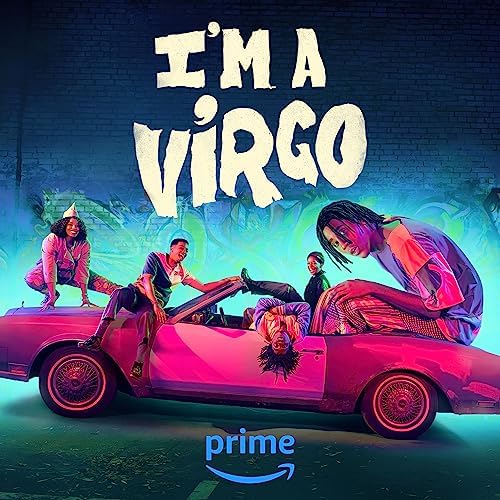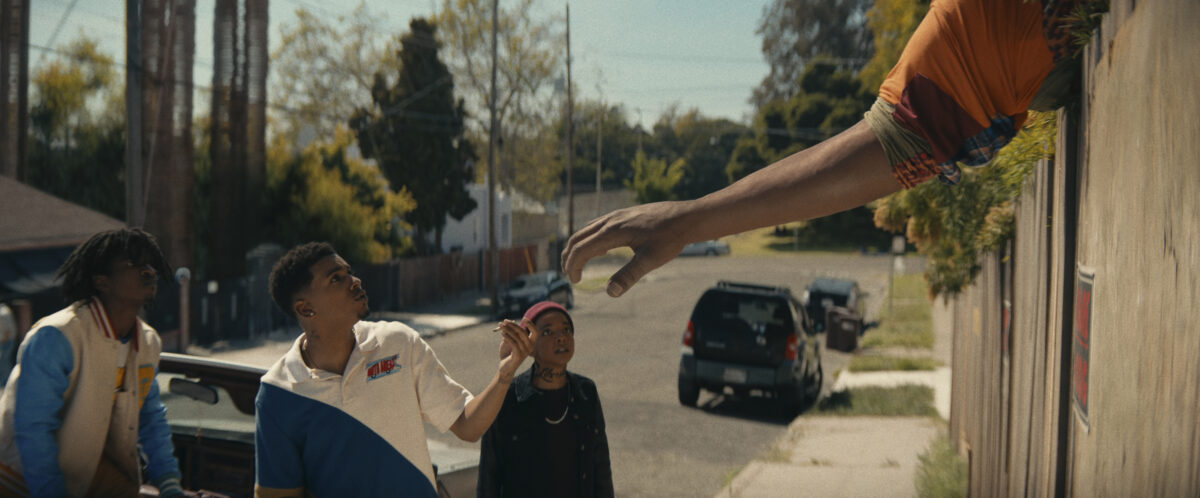Absolutely the most out-and-out revolutionary and surreally-weird television show of 2023 must be Boots Riley’s I’m a Virgo (on Amazon Prime). It begins with Cootie (played by Jharrel Jerome), who is thirteen foot tall and is brought up hidden in Oakland to protect him from an outside world that will be quick to mark him out as a monster. What Cootie knows about the outside world is through comic books and television, a distorted and idealised view of the world that composes it of villains and super-heroes.
The scene is set for some ideology-busting encounters with reality and, for Cootie, some confused clashes with the racism and sexism he has been absorbing and takes for granted. This already takes us into Frantz Fanon territory – racism as deeply-embedded in the subjectivity of the oppressed as well as the oppressors – but this is just the beginning, the springboard for some even deeper issues about the nature of capitalism today.
It’s pretty impossible to avoid plot spoilers here, but the seven episodes of about 30 minutes each are so packed with twists and turns and accumulating wackiness that any little give-aways now could not spoil it at all for you. You just won’t be able to track everything that’s going on and, warning, the story is not tied up neatly at the end; neither would it be, I suspect, in a second series, if Amazon Prime are rash enough to give Riley one. Anti-capitalist and anti-racist struggles for Riley are not composed of clear answers but mess and muddle, interminable contradiction and open questions; this is open communism.
Content and Form
That’s why, if you love it, you need to take the questions seriously, for there are aspects of the form of the series as well as the content that are clearly placed on the agenda here. As regards the content, it is surprising, perhaps, that both leftists and liberals love it. Counterfire enthused about it, for example, without reservation, and we do agree with them that it is pretty fantastic. But The Guardian also liked it, more though, it seems for its playful aspects than its politics, which it reduces, wait for it, to a “coming of age” show that is also about the difference between the “haves and have-nots.”
This agreement between leftists and liberals already raises a question about how television shows are geared to be injected with different ideas by different kinds of audience. It is not so easy to read off a revolutionary message from any show, however much you wish the message is there. Remember, always, remember, that every radical gesture can be recuperated, neutralised and absorbed by capitalism.

It is when we come to form of the show that we are sucked, whether we like it or not, into the cakes and circus realm of corporate mass media, in which Amazon Prime is a skilled player. Boots Riley grapples with this, as he did some years back with his wonderful parody of call-centre and corporate abuse culture in Sorry to Bother You, and he does it here by disrupting the CGI-world stuff that smooths out contradictions and lulls us into a kind of dreamland while we watch the telly.
Riley deliberately goes for a look that, at the edges, reminds us that this is not for real, with studio-sets built to size and camera-angles disturbing the set-up, making us think a bit about what we are seeing. And in the process he is giving us a critique of the plastic universe of heroes and villains that is being mined and sold to us by the media corporations.
Superheroes
To say that this series is about superheroes would be, dialectically-speaking, to both exaggerate and underplay what is going on in I’m a Virgo. These are the strangest super-heroes, with “powers” that make them both stand out from normative and normalising capitalist society – the kind of society that likes people to come in a manageable productive shape – and undermine its assumptions about what is “normal” in terms of body and mind.
In this sense, I’m a Virgo is playing at the edges of social model disability debates, but intersectionally, intwining them with anti-racism and, at key moments, feminism too. There are, by the way, some left-field sex scenes where assumptions about what must be done and said in bed are radically disrupted.

Thirteen-foot Cootie is pretty awesome, of course, but he then links up with some other characters who have their own significant differences from the norm. These include Flora (played by Olivia Washington) who is a cook in the sinister “Bing Bang Burger” outlet and who is, how to put it, very speedy, living life like ADHD on speed. And, there is a communist revolutionary heroine Jones (played by Kara Young) who has her political agenda written round her neck and has a beguiling power of persuasion as she rallies the comrades.
These are the real heroes, Cootie must learn, and they are very different as a collective force – a collective force that will include plenty of “little people” (no, really, little people) – from the individual brooding white billionaire “The Hero” (played by Wallace Goggins) who enforces law and order in black Oakland. He is a media tycoon. Think Elon Musk. This is a black consciousness show, black-led in writing and production and cast, and what there is of dominant white culture is shown up to be oppressive and miserable, infused with a self-sabotaging kind of false-consciousness. That collective systematic “false consciousness” is engineered by the cartoon clips that appear in the series and come to play a narrative function in it.
Media
This is all in the very mass media we are watching, of course, and I’m a Virgo is as much about mass-media as it is about the explicit struggles over housing and power supply that bring Cootie and Flora and Jones into alliance against the corporations and eventually against “The Hero.” Here again we are up against the “form” aspect of the series as opposed to the “content” we see or wish to see when we watch it. We need to notice this if we are going to make use of I’m a Virgo, make it a genuinely revolutionary contribution to anti-capitalist politics, not to let the show soothe us and let us forget the politics when we switch off the set.
For example, and it is only one, there is a bizarre cameo voice appearance of Slavoj Žižek in one of the cartoon clips where he appears as a demon baby spouting nonsense that bewitches the viewers. Here we are posed a real paradox, for, one hand, there are cartoons in the series that are designed to numb the players, distract them from their revolutionary collective task (“boyoboyoboyoboy” goes the mantra and image of lost lives that brings white male security guards to tears), and, on the other hand, there are stunning visuals conjured up by Jones – part of her superpower to persuade people to revolt against capitalist reality – that are disturbing, drawing attention to contradictions that then have to be worked through. Which, then, is Žižek here (and he clearly liked the series recommending it himself, perhaps flattered by being included in it)?
That is one more thing about I’m a Virgo, it is funny, bizarrely funny. Boots Riley uses humour alongside many other filmic devices to, as it were, “denaturalise” reality, break us from it, question it. Don’t let the show give you answers. This is the little trap we might fall into when we admire Jones’ charismatic leadership skills and think that collective action needs a vanguard to show the way (and I’m looking at you Counterfire). What is most radical about it is that it does not pretend to do that. In a way, I’m a Virgo alerts us to the dangers of normalisation – of certain kinds of bodies with certain kinds of abilities – and of “naturalisation,” the way we take those aspects of reality for granted.
Communist
Riley is a real radical, self-proclaimed communist, once member of the Maoist Progressive Labor Party, and still radical, steadfast anti-capitalist and revolutionary internationalist. In a recent interview with The Guardian, which placed I’m a Virgo 12th in its top TV shows he argues that “being communist is the closest to being a superhero there is”. The only way to stop him becoming a useful tool that enables capitalism to run more smoothly, he says, is “to be involved in a revolutionary organisation that is fomenting class struggle.” For us the show should be right at the top of the tree.
Art (50) Book Review (111) Books (113) Capitalism (65) China (77) Climate Emergency (97) Conservative Government (90) Conservative Party (45) COVID-19 (44) Economics (37) EcoSocialism (50) Elections (82) Europe (44) Fascism (54) Film (48) Film Review (61) France (68) Gaza (59) Imperialism (97) Israel (117) Italy (44) Keir Starmer (51) Labour Party (110) Long Read (42) Marxism (47) Palestine (140) pandemic (78) Protest (146) Russia (325) Solidarity (126) Statement (46) Trade Unionism (133) Ukraine (326) United States of America (124) War (360)

